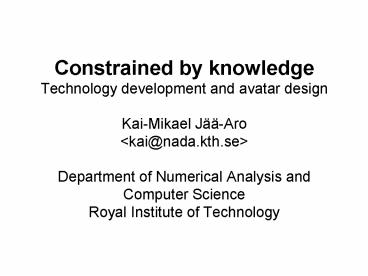Constrained by knowledge Technology development and avatar design Kai-Mikael J
1 / 12
Title:
Constrained by knowledge Technology development and avatar design Kai-Mikael J
Description:
an animated, articulated representation of a human which represents you, the ... available resources and is not crucially dependent on a 'realistic' environment. ... –
Number of Views:12
Avg rating:3.0/5.0
Title: Constrained by knowledge Technology development and avatar design Kai-Mikael J
1
Constrained by knowledgeTechnology development
and avatar designKai-Mikael Jää-Aroltkai_at_nada.kt
h.segtDepartment of Numerical Analysis and
Computer ScienceRoyal Institute of Technology
2
Avatar an animated, articulated representation
of a human which represents you, the user, in any
virtual environment.
3
Any?
In fact, what an avatar is and what it does, is
contingent on the specific situation and the
available technology. The design principles for
avatars have shifted over time with the prevalent
interaction paradigm.
4
Early virtual environments
Visual objects only, limited interaction, no
distribution ? no body representation.
5
Telepresence applications
The teleoperated device is the body
representation. It isnot determined by software
and is adapted to the specific task.
6
Shared applications
Body-tracked participants in an immersive virtual
environment can be represented by humanoid
figures. These support non-verbal communication,
enable awareness of presence and indicate
action. But, they are fundamentally limited to
what the master human body can do.
7
Desktop environments
User representations can be less human-like, but
still indicate presence, support (some)
non-verbal communication, but also convey
information not tied to the users actual
body. We retain our everyday applications on the
desktop.
8
Dehumanising the avatar
- We can strive to give the avatar humanoid
behaviour through available interaction tools. - or
- Releasing the avatar from anthroporphism, we can
add non-human abilities to it. - Perception and interaction need not be tied to a
single locus.
9
Navigation
- Navigation need not be moving through geometric
space.
Application-dependent navigation methods can move
through interest space.
10
View control
- On a desktop we can have multiple views of the
same environment. - Navigation can then be treated as view selection.
11
Mixed Reality
- Mixed realities exist simultaneously in physical
and virtual spaces. - No single user owns a given viewpoint/
actionpoint in the environment.
12
Presence and intelligibility
- Participants understanding of their environment
is constructed using available resources and is
not crucially dependent on a realistic
environment.































